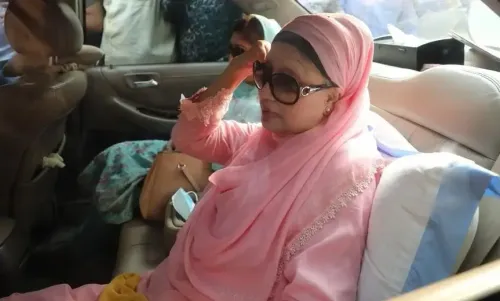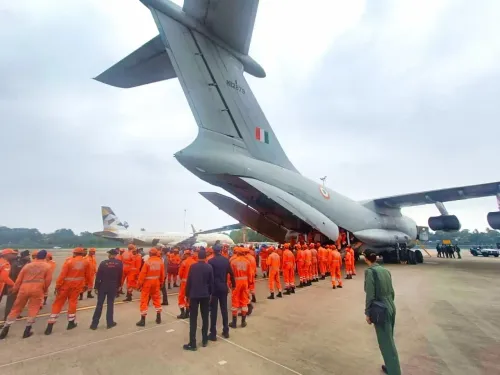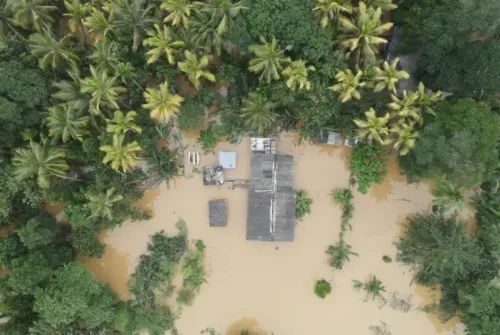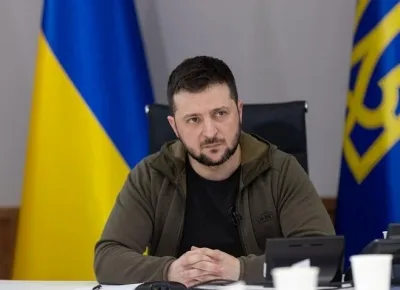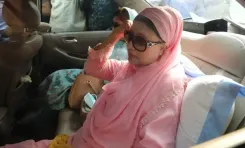Did an Artist and His Wife Flee to the UK After Censorship of Their Exhibition in Bangkok?
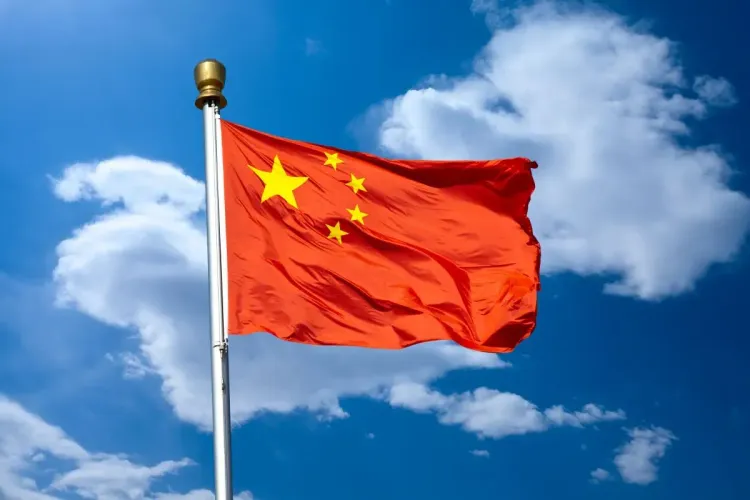
Synopsis
Key Takeaways
- Sai and his wife fled to the UK due to fears of persecution.
- The exhibition faced censorship after provoking the Chinese government.
- Human rights advocates condemned the situation as transnational repression.
- Artists' names were obscured in descriptions of their works.
- Support for freedom of expression is crucial in combating authoritarianism.
London, Aug 17 (NationPress) Burmese artist Sai was recently celebrating the launch of an art exhibition he curated with his wife at a prominent gallery in Thailand. Unfortunately, their display, which highlighted the repression by authorities, faced censorship after provoking the ire of the Chinese government.
The couple has since escaped to the UK, where they intend to apply for asylum. They allege that the Thai police are searching for them. However, a spokesperson for the police has denied any knowledge of such a search. Human rights activists have condemned the situation, labeling it an example of transnational repression, as reported by BBC News.
Sai noted that his exhibition, showcasing exiled artists from nations like China, Russia, and Iran, debuted at the Bangkok Arts and Cultural Centre on July 26, drawing frequent attention from representatives of the Chinese embassy as well as officials from Bangkok.
The exhibition, titled 'Constellation of Complicity: Visualising the Global Machine of Authoritarian Solidarity', aims to illustrate how authoritarian regimes collaborate in repression, according to an official description.
Sai accused Chinese officials of lodging complaints regarding works by Tibetan, Uyghur, and Hong Kong artists, initially demanding a total shutdown of the exhibition. However, he mentioned that the arts centre managed to negotiate a compromise, allowing the exhibition to continue after removing sensitive artworks and elements of installations.
As reported by BBC News, several artists' names were obscured with black paint in the descriptions of the artworks. Additionally, references to the artists' homelands were partially blacked out to conceal mentions of Hong Kong, Tibet, and Xinjiang.
Most of the censored artworks included pieces by Tibetan artist Tenzin Mingyur Paldron. Furthermore, television screens that were supposed to showcase films by the artist, including one about the Dalai Lama, were turned off.
Items such as Tibetan and Uyghur flags, a novel about a Tibetan family in exile, and a postcard discussing China, Israel, and Xinjiang were also removed from the exhibition. A staff member from the gallery told BBC News that attendance surged in recent days following the news of the censorship going viral online.
An email from the centre indicated they had been “warned” that the exhibition could provoke diplomatic tensions between Thailand and China. The email further stated that adjustments were made “due to pressure from the Chinese embassy” communicated through the Thai Foreign Affairs Ministry and the Bangkok city government, which is the centre's primary supporter.
In response to queries from BBC, the Chinese embassy issued a statement claiming the exhibition openly promoted Tibetan, Uyghur, and Hong Kong independence. It asserted that Thailand's “timely measures” illustrated that such a “false notion” is “unpopular and without market internationally.”
The statement further contended that the exhibition “disregards facts… distorts China’s policies on Tibet, Xinjiang, and Hong Kong, harming China’s core interests and political dignity.” Notably, it did not address allegations of pressure placed on Thai authorities and the arts centre.
The curators of the exhibition and participating artists have dismissed China's accusations. Paldron remarked that his films “conveyed heartfelt stories and sent a message of global solidarity.” He further commented that the censorship represents a Chinese “campaign of erasure and suppression” directed at Tibetans globally.
In an interview with BBC News, Sai emphasized that instead of seeking independence from China, “we advocate for freedom of expression, self-determination, and self-identification… basic human rights.” He further stated, “Our exhibition provides a platform for artists resisting authoritarianism. These voices are often silenced in their own nations. The fact that the Chinese Communist Party attempts to suppress it underscores the very point they are making.”
Sai and his wife left for the UK out of fear of being deported back to Myanmar, where Sai believes he will face persecution for his activism against the junta. Just two days after the exhibition opened, the couple learned that Thai police were searching for them.
They received messages from gallery staff informing them of police visits to the exhibition and requests for their contact information. At that moment, Sai realized, “we had to leave the country.” They promptly booked tickets for the next flight to the UK.
Thailand’s national police spokesman Achayon Kraithong stated he had not heard of any police looking for Sai.
The couple initially fled Myanmar in 2021 following the military coup and eventually settled in Thailand, deciding to hold their art show in Bangkok due to the large Burmese community there. Sai believed that “Thailand plays a critical role in promoting peace and stability for Myanmar… It’s a secure place.”
He now feels differently.
“Due to our activism, the targeting by authoritarian regimes against us has multiplied… my wife and I have no choice but to seek asylum in the UK.”
Lord Alton of Liverpool, chair of the UK Parliament’s Joint Committee on Human Rights, remarked that Sai’s case exemplifies the reach of China’s campaign of “transnational repression” and expressed support for Sai’s asylum request, according to the report.
“To pressure an art exhibition to censor exhibits in a cultural centre in another country is an outrageous violation of freedom of expression and should be widely condemned. The additional fears this instilled in Sai, leading him to flee Thailand for safety, are deeply troubling,” he stated.
The Human Rights Foundation has described the incident as “intimidation” reflecting a coordinated effort to stifle artistic expression. Thailand-based activist Phil Robertson deemed it “outrageous and unacceptable” that Bangkok city officials allowed for Chinese censorship.

